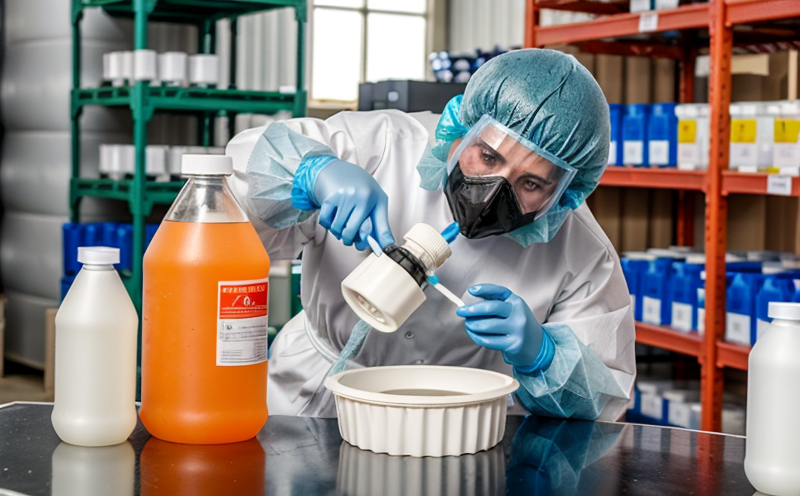USP Sterility Testing of Packaging Systems
The US Pharmacopeial Convention (USP) Sterility Testing is a critical quality assurance procedure that ensures the sterility of packaging materials used in pharmaceutical and biopharmaceutical applications. This testing is particularly essential for ensuring patient safety by preventing contamination with microorganisms or other pathogens which could lead to serious health risks.
The sterility testing process involves inoculating packaged samples with appropriate test organisms, incubating them under controlled conditions, and monitoring for the growth of any microorganisms that might have breached the packaging integrity. This procedure is performed in compliance with rigorous standards set by USP to ensure that all packaging systems meet strict sterility requirements.
The primary goal of this testing is to validate that the packaging material does not allow microbial ingress, thus protecting the product inside from contamination during storage and distribution. Compliance with USP is mandatory for many pharmaceutical companies and medical device manufacturers who require a sterile environment for their products.
The test process involves several key steps:
- Sample preparation: Packaging samples are prepared according to the protocol outlined in USP .
- Inoculation: Test organisms are inoculated into the packaging under controlled conditions.
- Incubation: The packaged samples are incubated for a specified duration, typically 14 days at 35°C ± 2°C.
- Inspection: After incubation, the packages are carefully inspected for any signs of microbial growth.
The acceptance criteria for this test are stringent and are designed to ensure the highest level of sterility. According to USP , no visible or detectable microbial growth should be observed in any part of the package after incubation. This ensures that the packaging material is effective in maintaining a sterile environment, which is critical for pharmaceutical products.
Our laboratory adheres strictly to these guidelines and uses state-of-the-art facilities and equipment to ensure accurate and reliable test results. We employ highly trained professionals who are experts in microbiological testing, ensuring that each sample undergoes thorough analysis. Our commitment to quality and precision guarantees that our clients receive accurate and timely reports, which are essential for regulatory compliance.
The importance of sterility testing cannot be overstated. In the pharmaceutical industry, any breach in packaging integrity could lead to contamination, which can have severe consequences for patient health. By ensuring that packaging materials meet strict sterility standards, we contribute significantly to the safety and efficacy of medical products.
Benefits
The benefits of USP Sterility Testing extend beyond just compliance with regulatory requirements. Here are some key advantages:
- Enhanced Product Safety: Ensures that packaged products remain free from microbial contamination, thereby protecting public health.
- Regulatory Compliance: Helps pharmaceutical and medical device manufacturers meet stringent regulatory standards set by USP .
- Patient Confidence: Builds trust among healthcare providers and patients, who rely on the safety of their medications.
- Product Integrity: Guarantees that packaging materials maintain their integrity throughout storage and distribution.
- Cost Efficiency: Reduces the risk of product recalls and associated costs by preventing contamination early in the production process.
The comprehensive nature of this testing ensures that all potential risks are identified and mitigated, leading to a safer and more reliable product. This not only benefits the manufacturer but also contributes to overall public health safety.
Why Choose This Test
Choosing USP Sterility Testing is a strategic decision that can significantly impact your business operations and patient safety. Here’s why you should consider this service:
- Rigorous Standards: The test adheres to the stringent guidelines set by USP, ensuring reliability and accuracy.
- Expertise: Our team of microbiologists and quality assurance experts are well-versed in this specialized testing method.
- Comprehensive Analysis: We provide a detailed analysis of each sample, offering insights into potential vulnerabilities in packaging materials.
- Quick Turnaround: We understand the importance of timely results and strive to deliver accurate reports within specified deadlines.
- Regulatory Support: Compliance with USP ensures that your products meet all necessary regulatory requirements, minimizing the risk of non-compliance penalties.
The decision to invest in this testing service is not just about meeting legal obligations; it’s a commitment to excellence and patient safety. By choosing our laboratory for USP Sterility Testing, you can be confident that your packaging materials are meeting the highest standards of sterility and integrity.
Environmental and Sustainability Contributions
While the primary focus of USP Sterility Testing is on ensuring product safety and compliance with regulatory requirements, it also has significant environmental and sustainability contributions:
- Eco-friendly Packaging Materials: By identifying and eliminating packaging materials that do not meet sterility standards, we contribute to the use of eco-friendly alternatives.
- Reduced Waste: Ensuring product integrity through sterility testing can reduce the need for additional packaging layers or changes in design, minimizing waste.
- Sustainable Supply Chains: By ensuring that only compliant materials are used, we help maintain sustainable supply chains that support long-term environmental goals.
- Resource Efficiency: The rigorous testing process helps in the efficient use of resources by identifying and correcting any issues early in the production cycle.
In today’s world, sustainability is a key consideration for many organizations. By choosing USP Sterility Testing, you are not only enhancing product safety but also contributing to environmental stewardship. This aligns with broader sustainability initiatives that aim to reduce waste and promote responsible resource use.





